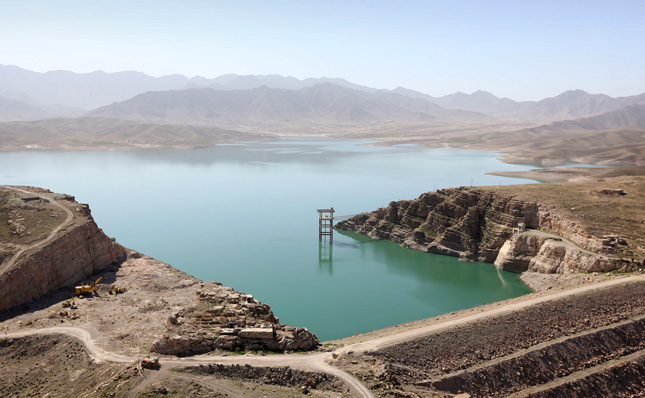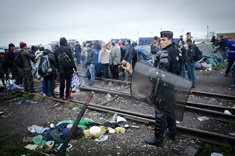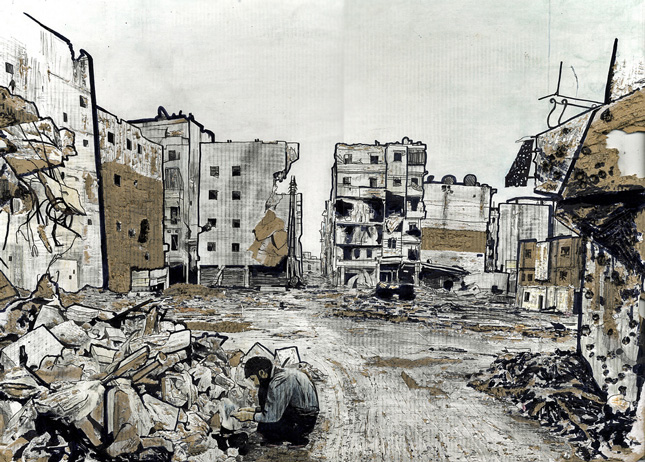-
Afghanistan’s Water Plans Complicated by Worried Neighbors
›
More than 40 years ago, the Soviet Union attempted to harness hydropower to modernize Afghanistan. Between 1960 and 1968, they poured money and technical knowledge into the 100-meter Naghlu gravity dam outside Kabul and a village for its workers called Sharnak. Although the town has been damaged and the boons of modernity remain elusive for many Afghans, the dam remains a crucial source of power for the capital and is the largest power plant in the country with an installed capacity of 100 megawatts.
-
Ground Truth Briefing: Is Climate-Related Migration a National Security Issue?
› Experts predict that climate change will spur some people to leave their homes and countries. How will national security be affected as a result?
Experts predict that climate change will spur some people to leave their homes and countries. How will national security be affected as a result? -
Michael Kimmelman, The New York Times
Mexico City, Parched and Sinking, Faces a Water Crisis
›February 20, 2017 // By Wilson Center Staff
MEXICO CITY – On bad days, you can smell the stench from a mile away, drifting over a nowhere sprawl of highways and office parks.
-
The Common Ground on Refugee Resettlement and Security
›
President Trump seems to conceive of domestic counter-terrorism efforts as analogous to a police roadblock. Potential terrorists, like vehicles, wait in single file, pull up to the checkpoint, are evaluated, and either stopped or allowed to proceed depending on whether they pose a threat. If only our vetting can be made “extreme” enough, we can apprehend those intending us harm.
-
Torn Social Fabric: Water, Violence, and Migration in Central America
›
In the first half of last year, 26,000 unaccompanied children were apprehended by U.S. law enforcement trying to cross the southern border. Most came from Central American states like El Salvador, Guatemala, and Honduras. Such displacement is just the tip of the iceberg in terms of migration in the region. Many more are moving from rural to urban areas and into neighboring countries seeking opportunity and fleeing violence.
-
Global Water and National Security: Why the Time Is Now
›
During the 2016 campaign President Trump stated that clean water would be a top priority of his administration, telling ScienceDebate.org “it may be the most important issue we face as a nation for the next generation.” Now is the time to make good on that commitment.
-
Vice-President Eduardo Stein on Water Conflict in Guatemala: Origins and Solutions
› Since 2014, Central America has experienced a dramatic lack of rainfall, destroying grain crops and killing cattle. As of last summer, 2.8 million people were impacted by drought and 900,000 were at risk of malnutrition in Guatemala alone. The effects of environmental change have been especially acute in Guatemala because they are layering on top of existing dysfunction and instability, says Former Vice-President of Guatemala (2004-2008) Eduardo Stein in this week’s podcast.
Since 2014, Central America has experienced a dramatic lack of rainfall, destroying grain crops and killing cattle. As of last summer, 2.8 million people were impacted by drought and 900,000 were at risk of malnutrition in Guatemala alone. The effects of environmental change have been especially acute in Guatemala because they are layering on top of existing dysfunction and instability, says Former Vice-President of Guatemala (2004-2008) Eduardo Stein in this week’s podcast. -
Wartime Public Health Crises Cause More Deaths Than Weapons, So Why Don’t We Pay More Attention?
›
In 2004 I was honored to be interviewed for The Lancet medical journal’s “Lifeline” series. I had just come away from a disastrous short tenure as the interim minister of health in Iraq following the 2003 war. I had support from former Secretary of State Colin Powell to rapidly mitigate and recover the war-related destruction of essential public health infrastructure and protections required as occupiers under Articles 55 and 56 of the Geneva Conventions that follow every war.
Showing posts from category migration.


 Experts predict that climate change will
Experts predict that climate change will 



 Since 2014, Central America has experienced a dramatic lack of rainfall,
Since 2014, Central America has experienced a dramatic lack of rainfall, 


